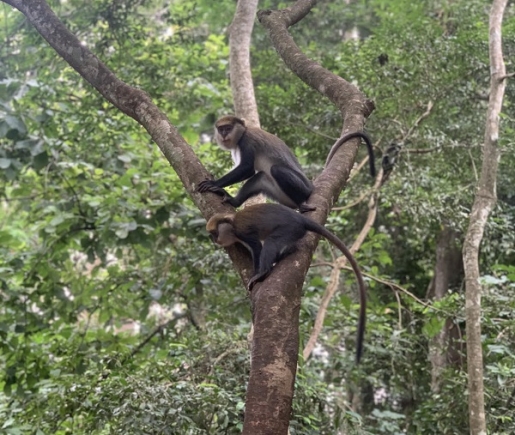
Living with monkeys at Boabeng- Fiema
Story & pictures by Lydia Ezit, BOABENG-FIEMA
Two traditional wardens who first served at the Boabeng-Fiema Monkey Sanctuary in the Nkoranza North District of the Bono East Region are said to have died as virgins to maintain the sanctuary.
Advertisement
The two virgins, Afia Boahen alias Afia Fofie, aged 120, died on July 3, 1978 while Kwabena Amponsah, aged 50, died on March 4, 1974.
Their key duty was to feed the monkeys at an annual festival performed for the sanctuary and only virgins were required by the traditions and customs of the shrine in the area to do so.
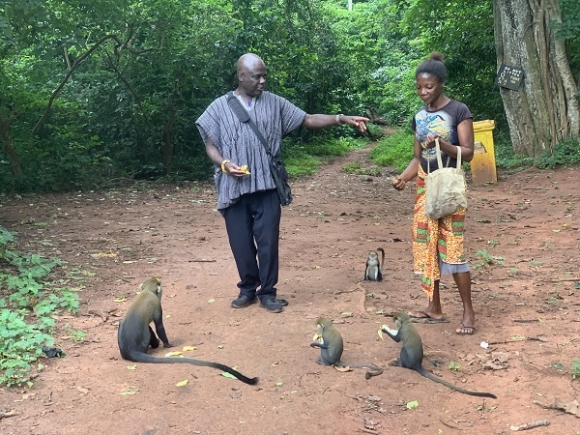
Visitors are allowed to feed the monkeys
Ritual
During a visit by The Mirror to the sanctuary last Friday, some community members who believed that the role of the virgins had led to the preservation and purity of the sanctuary till today were of the opinion that the two had not been celebrated enough.
Pokuaa, a resident of Atebubu who had relocated to Fiema said, “My father-in-law has said a lot about Afia Boahen and we wonder why they hardly mention her whenever they are telling the story of the sanctuary”.
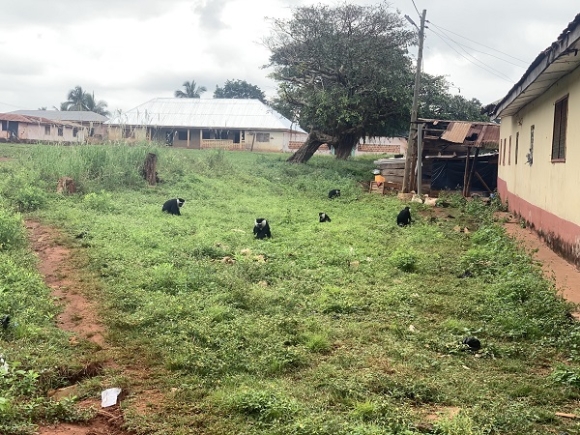
Some black and white Columbus spotted at Fiema
A retired educationist, Nana Adu said, “These are people who gave themselves so we can have something as our own”.
For instance, he mentioned a man in his narration as “the late Akowuah”, explaining how he consistently wrote letters to the tourism ministry to have the forest converted into a tourism facility.
“ The only thing that has been done in honour of Akowuah is to emboss his initiative on his grave, we hardly mention him.
But they have all done well,” he said.
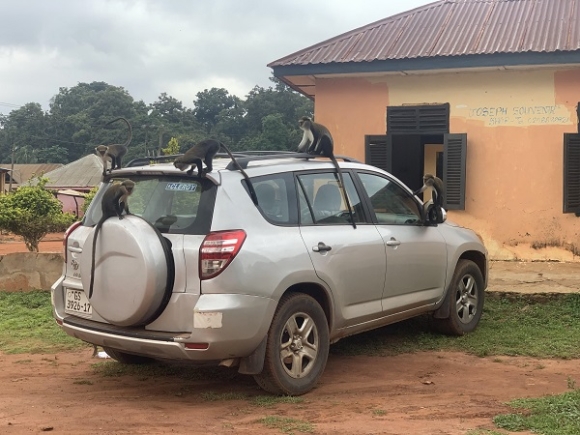
Monkeys having a field day on a visitor's car
Asked whether the ritual was still being performed, a tourist guide at the sanctuary who had served for 12 years, Ms Sophia Dansoaa Opoku, told The Mirror that “it is still being done but the problem is we no longer get virgins”.
She said since the death of the two in the 70s, they have had difficulty in getting virgins to replace them.
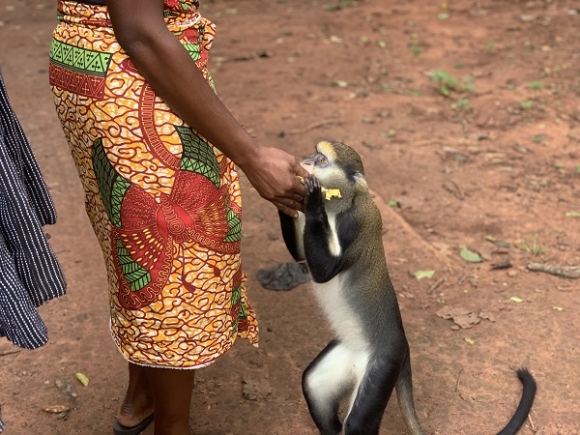
Monkeys enjoy eating banana
“And so in the absence of virgins, the monkeys we consider sacred are not being fed by virgins as customs and traditions demand. Those who feed them are all non virgins. Some years back, they tried looking for virgins but they didn’t get any”, she explained.
However, she could not explain the effect of the feeding of the monkeys by non virgins on the sanctuary.
Burial
She explained that the community honoured the two late virgins by burying them in the monkey cemetery deep in the forest. Adding that the monkeys were given a befitting burial just like humans.
“ When a monkey dies, it is wrapped in calico, put in a coffin and special funeral rites are performed”, she explained.
Boabeng-Fiema
Boabeng-Fiema is a twin community where monkeys and humans live together in harmony.
It hosts a monkey sanctuary which is home for to 1,200 monkeys.
Ms Opoku said the sanctuary was open from Monday to Sunday between 8a.m. and 5p.m. for a fee of GH¢5 and GH¢15.
Forest
In the forest, The Mirror saw many trees, birds and monkeys.
In the humid air one could hear the consistent chirping of birds and even the trees seemed to vibrate with sounds.
According to Ms Opoku , “ we get visitors daily and they all enjoy touring the forest and playing with the monkeys”.
Challenges
She said however that , “our main challenge is the bad nature of our road. It prevents tourists from coming in during the rainy season.
“And because of the nature of the road, some drivers feel reluctant to convey tourists from the Nkoranza station to Fiema , and they charge too much because their excuse is that by the time they arrive at the facility their already rickety vehicles would have developed faults”.
History
Speaking about the history of the sanctuary, Ms Opoku told The Mirror that a hunter called Nana Kwabena Amoah of the Boabeng village went hunting in the forest and found a small pan known locally as Yaawa, covered with a white scarf by river called Daworo.
She said the hunter picked the yaawa, brought it home and the next day and at the same mysterious place, the hunter spotted two Mona and two black and white Columbus monkeys.
She said these four monkeys followed the hunter home and based on these discoveries, the hunter consulted an oracle.
“ The gods explained that the monkeys were the children of the river, Daworo. If the community liked the monkeys, then he should not return the yaawa to the spot he picked it from but if they did not like to have the monkeys in their town, then he should return the yaawa. Because they had already fallen in love with the monkeys, they agreed to keep the yaawa”, she explained.
The tourist guide said the oracle gave only one condition and that was to ensure the safety of the monkeys,” no one should kill or harm them”.
She disclosed that the monkeys over the centuries were believed to be humans and could visit any part of the two communities without fear of intimidation.
“They are considered untouchable and must be protected. They move freely and feast on anything within the households. The Mona monkeys love to eat boiled eggs and yam. When they come to your home or enter your kitchen and your food is not covered , ah, ah, they will grab it quick,” she said with a long laughter.
Monkey co- existence
Ms Opoku said the Mona monkeys were friendly unlike the black and white Columbus with the notion that “human beings are bad so it doesn’t eat our food but stay away from humans and feed on grass”.
Although the two monkeys with distinct features co-exist peacefully, she said “they live in colonies and have their own territories to protect and so when one crosses into another yard, there is always a fight”.
Encounter with monkeys
The Mirror noted that the black and white Columbus kept its distance from community members but the Mona monkeys mingled with people, swinging among them and gathered in their numbers around the vehicles of visitors.
One of the interesting moments was when out of no where, one of the Mona monkeys jumped onto the head of this reporter making her scream so loudly while visitors around laughed.
The Mirror also saw how a monkey entered a household and made way with “poloo”, a local snack.

The nature of the road is a challenge to the sanctuary
Some community members at Fiema said they enjoyed the company of the monkeys but they were always alert when preparing food, “ otherwise by the time you realise, they would have taken your meal”.
Others pleaded with the government to fix their roads not only because of the facility, but because on rainy days , some health officials were unable to go to work because of lack of transportation.
Writer’s email address: [email protected]




